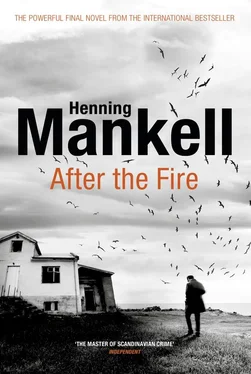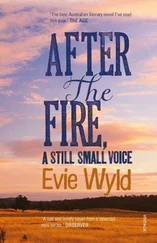‘Will they put her in an incubator?’
‘They already have. I must confess I’m lost for words.’
‘And you chose to call me? That’s nice.’
‘I don’t have anyone else to call.’
‘I’m sure you do.’
‘Perhaps we could have a drink, wet the baby’s head?’
‘Not at half past six in the morning.’
‘At the weekend?’
‘Maybe. Ring me in a couple of days.’
‘You ring me.’
She promised to get in touch, and I immediately began to look forward to seeing her again. It was a long time since the trip to Paris.
I called Jansson.
‘I’ve got no power,’ he said. ‘If that’s what you wanted to know.’
‘Louise has had her baby. A little girl.’
There was a pause, then he said, ‘Isn’t that a bit early?’
‘Yes, but everything’s fine. I hope.’
‘In that case allow me to congratulate you on behalf of the entire archipelago.’
Sometimes Jansson expresses himself in the most peculiar way. His words can border on pomposity, but right now it felt as if he really meant it: he was representing the collective joy of the islanders. He had made me a part of the ever-dwindling population of the archipelago. I was no longer an outsider.
‘Thank you,’ I said.
Then we talked about the storm. Jansson had contacted the electricity company, and they hoped to have the power back on by nine. Apparently a substation where the cable left the mainland had been damaged. In addition, the wind had brought down a large number of trees.
When the conversation was over, I went back to the caravan, lay down and waited for the dawn. As the grey light filtered in, I went outside again. Up on the hill, not far from my grandfather’s bench, an oak tree had come down, the roots sticking up like a giant mushroom that had been kicked to pieces. I walked all the way around the island and was able to ascertain that the fallen oak was the only casualty. All the other trees had survived. The topsoil might not be very deep out here, but the trees are tough, clinging on with their claw-like roots.
I fetched my handsaw and cut a slice from the trunk of the oak. It seemed to take forever; I was dripping with sweat by the time I finished. I went down to the jetty for a dip, then dried myself off in the caravan. I took my magnifying glass to the boathouse, sat down and counted the rings. To my surprise, the tree was older than I could have imagined. After checking again to make sure, I concluded that the first ring dated from 1847. The following year, when the oak was no more than a sapling, the European revolutions took place. I worked my way outwards, as if I were on the edge of eternity. I placed my finger on the line separating 1899 and 1900. A war begins in 1914, another in 1939. I was born in 1944, the year before the war ended. And now the tree had fallen in a December storm, all those years after it began to grow.
I left the slice of wood in the boathouse, went outside and sat down on the bench, which was sheltered from the wind. The waves were still choppy, and there was the odd squally shower from time to time.
The power had been restored, just as the company had promised Jansson. All the lights came on at five past nine in the morning, and late in the afternoon I noticed that the wind had started to die down, although far out at sea the waves were pounding the reefs on the surface. Once again I walked around the island.
I couldn’t stop thinking about Louise and my granddaughter. Ahmed rang again in the evening and told me that all was well with Louise and the baby. Of course he didn’t mention what both he and I knew: that there were many hurdles to overcome for a child born so prematurely.
‘Have you chosen a name?’ I asked for the want of anything else to say.
‘Not yet.’
I heard him laugh. I still couldn’t understand what Louise saw in him, but his laugh gave me a clue.
That evening I sat down to plan my New Year’s Eve party. I noted down the food I had discussed with Veronika and made a list of the beer, wine and spirits I would buy. All the time I could picture that tiny baby in her incubator.
When the storm had passed, I went over to the mainland and talked through the whole thing with Veronika. She didn’t think I needed to buy crockery; she could lend me whatever was necessary from the cafe. She would also bring chairs because there was only one chair and a stool in the caravan.
‘Tablecloths?’
‘Yes, please.’
She jotted everything down on the back of a receipt book.
Then we talked about Oslovski. The story of the stolen car, Jansson and the magazine, and my peculiar conversation with the woman on the phone, whose brother was apparently selling the car, was the talk of the town. Veronika knew all about it.
‘They must be local,’ she said. ‘Someone who knew what she had in the garage.’
‘Do people suspect anyone in particular?’
‘No.’
I wasn’t sure if I believed her. The answer had come much too quickly. Perhaps she had someone in mind, but I let it drop. I was convinced that the DeSoto would never be recovered.
We spoke about the precarious financial situation of the cafe, and Veronika confided in me that she had started to think about moving.
‘To a different cafe?’
‘To a different country. I might open a cafe, I might not.’
‘You’d be missed.’
‘Maybe, maybe not.’
The bell over the door pinged and a dozen or so people came in.
‘The local council,’ Veronika whispered. ‘They’re going out into the archipelago to plan where to put the new toilets. Can you believe it takes that many civil servants to make a decision?’
Before I picked up the car, I went to the chandlery. Needless to say, my wellingtons hadn’t arrived.
I drove into town and did my shopping for the party. I loaded the five bags I filled into the car before going to the bank and the pharmacy to stock up on cash and medication. I stopped outside the shoe shop. It was closed, the window empty.
Every now and again I have a little flutter on the horses. I know nothing about harness racing and I’m too idle to study the form before I place a bet, but on one occasion, twenty years ago, I was almost horrified to find that I had won no less than ninety-six thousand kronor — 96,322 kronor, to be exact. I will never forget that moment.
When I received the money I went to South Africa, even though apartheid was still in force. I hired a car at Nelspruit airport and drove to the Kruger National Park. I spent a week there, driving from one overnight post to another. I experienced the ever-present arrogance of the whites towards the blacks. There was a strange silence everywhere. The whites spoke to the blacks or coloureds only when issuing an order. I never heard a relaxed conversation between the races. I was terribly upset and tried to show kindness towards the blacks who served me at mealtimes or topped up my car with petrol, but my friendliness made them wary, suspicious.
I travelled around the vast park and encountered all the wild animals I had hoped to see. I had the constant feeling that the animals saw me twice as often as I saw them. A boa constrictor had half-swallowed a wild-boar cub. A pride of lions was tearing at a zebra. I was a visitor, a polite guest cautiously knocking on the door of untamed nature.
I spent the rest of the money on some expensive suits and dining at exclusive restaurants. I even bid fifteen thousand kronor for a statue of the Buddha at an antiques auction. I lost it when my house burned down.
I went into the betting shop in the town centre and worked out an improvised system of a couple of hundred lines on harness races in Solänget. God knows where that was. Needless to say I didn’t recognise the names of any of the horses or the drivers, but I decided I preferred a horse called Bumblebee’s Brother to another in the same race with the name Wolfskin. The owner of the shop was a man whose bald head had an indentation to the left of his temple. According to Jansson, who knew all about everyone’s medical problems, the man had had an accident with his tractor when he was trying to get his old motorboat into the water one spring many years ago. Jansson thought it was remarkable that he had survived without suffering brain damage, but during my years as a doctor I often saw people whose heads were a very odd shape as a result of accidents without any loss of their mental capacities. In particular I remembered a young academic researcher who was regarded as a mathematical genius both before and after a car accident. His head looked like a cone.
Читать дальше












